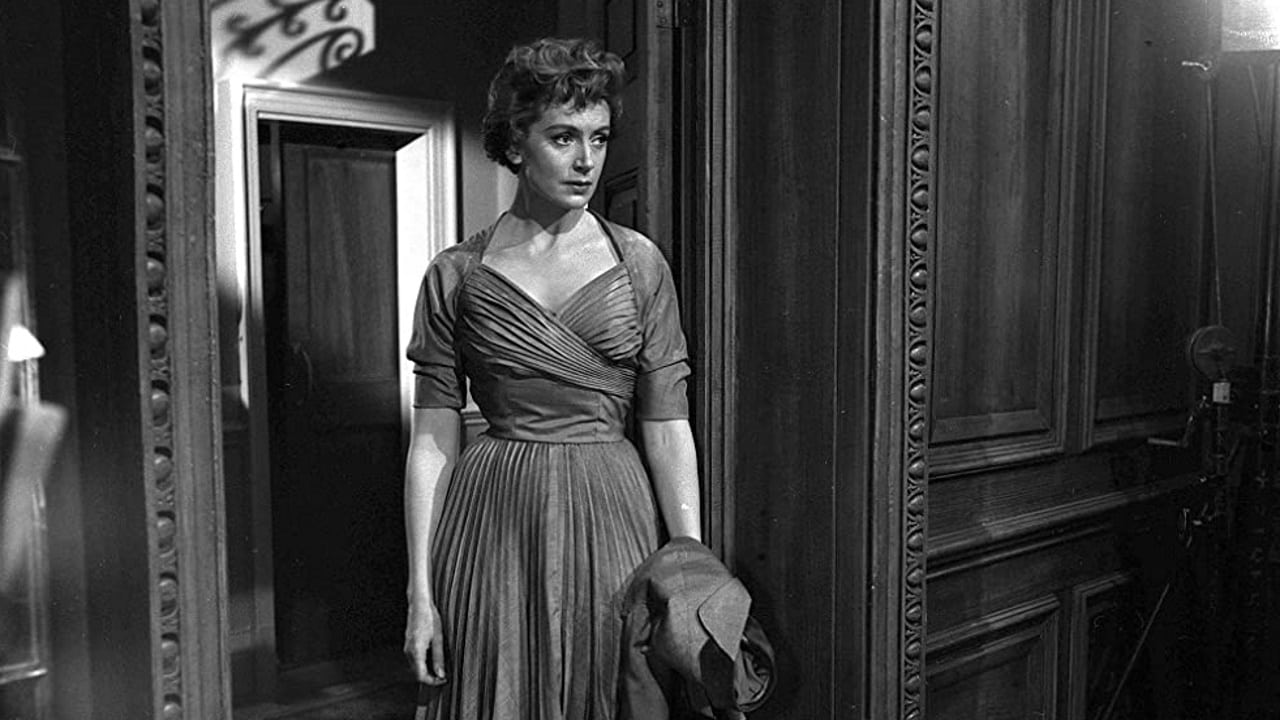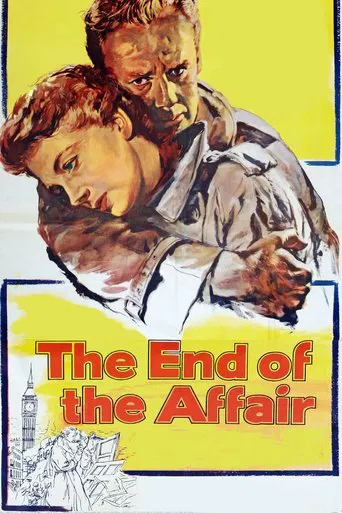

Graham Greene's The End Of The Affair has Van Johnson coming over from America and Deborah Kerr returning to the United Kingdom for this British film with British supporting cast. Of all the Graham Greene work I've seen on the big and small screen this is the most overtly Catholic film I think was ever done.Kerr is married to dull and earnest Peter Cushing and one night at a party during World War II she meets American writer Johnson who after being invalided out of the service stayed on Great Britain. Johnson intrigues and excites Kerr and the two of them are soon in love. Then the guilt starts. Guilt on Kerr's part, jealousy on Johnson's. Poor Cushing for most of the film he hasn't a clue.After the beginning the two can never quite get together. Imagine Johnson who is the paramour hires a private detective to keep track of Kerr's movements to reassure Cushing. This is after things have cooled down. What a pair Johnson has. The detective is John Mills who I'm surprised is taking a small supporting role. He even takes along his young son Christopher Warbey for his surveillance work, the better that his subject doesn't think he's being followed. Besides he's breaking him into the business. The part must have intrigued Mills because he's the best one in the movie.I suppose being a Catholic really helps understand all the subtleties in the story. I much preferred that other affair film Johnson did with Jane Wyman, Miracle In The Rain. No guilt, just people in love.Cushing's character was odd. He was sweet but weak, the kind you feel sorry for. No grand passion was ever to be forthcoming with Kerr or anyone else he would have ever hooked up with.The End Of The Affair is all right. The remake done in 1999 with Ralph Fiennes in the Van Johnson role was more explicit. If you like Graham Greene you'll like both versions.
... View More****SPOILERS**** Schmaltzy yet very penetrating film about forbidden love in the betrayal of one's spouse that leads to a series of life changing, as well as ending, events to all those involved. American writer Maurice Bendrix, Van Johnson,had been discharged from the US Army because of a trick knee and decided to spend the rest of the war in London writing a novel about the British civil service system. Meeting the Miles at a party Maurice notices civil servant Henry Miles',Peter Cshing, sexy wife Sarah, Deborah Kerr, smooching with a British Tommy out of the corner of his eye, in a back-room mirror, and feels that she's easy. The first time he's alone with Sarah in a pub, Maurice makes his move on her.Sarah is immediately smitten by the handsome and sweet talking American who's just the opposite of her dull by the books civil service husband Henry. Because Maurice has a very suspicious mind, unlike Henry, his affair with Sarah has a lot of bumps in it. The end comes when he's all alone with her while, like almost during the entire film, Henry is away at work. The Miles house is hit by a German V1 rocked knocking Maurice down a flight of stairs and burying him in the rubble. It's when Maurice miraculously recovers that he notices that the concerned for his life and safety Sarah had completely changed but the reason for her disaffection for Maurice is totally misunderstood by him. That's what leads to the crisis that follows in later driving both lovers to the brink of madness or even death and self-destruction.The movie cleverly has a number of parallel scenes inserted into it where we see what's the real reason behind Sarah's strange behavior, it has to do with her religious beliefs. Sarah is torn between her religion, Catholicism, and her love, while she's married to Henry, for another man Maurice. We also see that Marcice is determined to have Sarah all to himself and that he doesn't care it if would in the end not only kill Sarah but her weak and overly sensitive husband Henry ,who's life without her would be worthless.The ending is a bit too over dramatic even for this schmaltzy tear-jerker with Maurice almost on the brink of an emotional melt-down. He's****MAJOR SPOILER***told by the Miles family doctor that his beloved Sarah's, who at first was only suffering from a very bad cold, condition turned for the worse and with that she suddenly and unexpectedly passed away. It's the guilt of not leaving Maurice and getting on with her life with Henry that seemed to have driven Sarah, unconsciously not willfully, to kill herself! Even though it wouldn't conflict with her religious beliefs and in the end make everything turn out for the better in this three sided wild and forbidden love affair.Somewhat dated but still hits the spot with Deborah Kerr as both beautiful and sexy as ever, even with all her clothes on. Deborah or Sarah does her best and succeeds in showing how it's hard to overcome one's emotions when nature or what turned out to be the man of her dreams, Maurice, takes hold of them. You have to give both Deborah Kerr and her co-star Van Johnson credit in generating enough heat in the theater, or at home of those watching the movie, without having to turn to up the thermostat and thus saving a mint on the energy bill.
... View MoreI am indebted to Turner Classic Movies for televising this film today. I had not seen it. I am a great admirer of both the novel and the 1999 film version by Neil Jordan. I count it as one of the greatest love stories in literature.Yes, Van Johnson is miscast as Maurice Bendrix. Still, he is a sincere actor and his work is good considering that Maurice has been "Americanized." I wasn't prepared for the devastating performance by Deborah Kerr. Sarah Miles is one of literature's greatest creations. The "saint" as "whore." Or is it the "whore" as "saint?" I found myself engrossed and deeply moved watching her. It only confirmed my belief that she was with Vivian Leigh one of the two best English actresses in cinema. I love Julianne Moore in the 1999 version and equally love Deborah Kerr in the 1954 version. Sarah Miles is such a great creation that it would be wonderful to see another filmed version and compare the work of three actresses.Incidentally, "The End of the Affair" is one of those notable works of literature that went from the page to the screen to the opera house (Jake Heggie, composer -- commission by The Houston Grand Opera -- 2004.) I do like the treatment given to the other characters in the 1954 film version. We get to meet Smythe and the priest and Sarah's mother. In the Neil Jordan screenplay, Smythe and the priest are combined into one character, a Catholic priest named Smythe. Sarah's mother is omitted in that version. If I was disappointed in the 1954 version it has to do with the character of Smythe. His character has a horrible facial birthmark that Sarah kisses when she parts from him. In the novel we are told that the birthmark disappeared upon her death. We have no idea that this happens in the 1954 film version. In the 1999 film version, the birthmark is given to Lance, Parkis's son. Also, in the novel, Lance suffers from stomach disorders. We learn that he is cured of that upon Sarah's death. No mention is made of this disorder in the 1954 film version.Henry Miles, the cuckold, is more tragically portrayed in the 1999 film version. I tip the scales in favor to Stephen Rea whose performance is so true to the gravity of Graham Greene's creation.A great story of human and Divine love with Maurice and Henry fighting for possession of Sarah's soul and only God receives it.
... View MoreAn American writer meets the wife of a civil service acquaintance and quickly starts an affair with her. However Maurice is plagued with feelings of guilt and jealousy against Henry having Sarah, and bitterness that Sarah is being deceitful to her husband and perhaps, him too. After a bombing falls near their love nest, Sarah leaves and Maurice assumes that she had wished him dead. When Henry confides in him about his wife's possible infidelity, Maurice poses as her husband and hires a private detective to follow her and find out what she's doing.I have not seen the remake but was quite interested to see how a 1950's movie would manage to depict the illicit affair between Maurice and Sarah without breaking every moral code of the day. The answer is with lots of talking. The film is significantly shorter than the modern version and had less controversy (or at least, does now) but it still manages to bring things out. The plot is pretty good but relies very heavily on the extended flashback/journal sequence to keep things going. The talk heavy feel is a little tiring but does work well the characters' emotions are brought out well without profanity or nudity.I don't think Johnson fitted the role that well but he was still good. His inner bitterness and guilt came out well at points and he brings his complex character out well. Kerr is also good although her role is less difficult. She does have to carry the whole journal sequence near the end and she doesn't let the film dip. Cushing only has a few scenes but he is very good. He gives an English gent performance but eventually you can see the cracks as he tries to hold his feelings together.Overall this is a solid adaptation of the book that manages to bring out the subject matter without the sexual excess of the modern version. While it is a little heavy on dialogue at times, the emotions come out with all the stilted control of the period and it works quite well as a subversive melodrama.
... View More